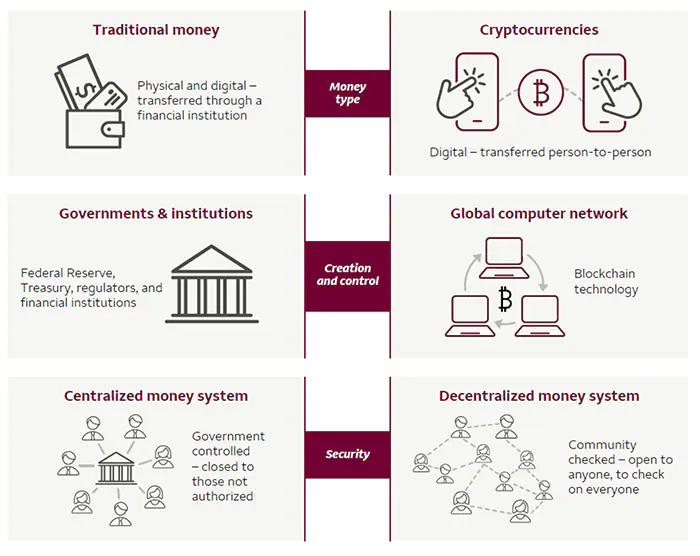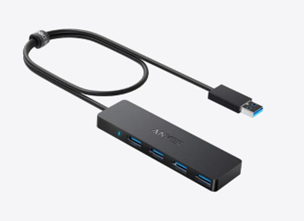Dr. Bina Ramamurthy is director of the Blockchain ThinkLab at the University at Buffalo. She’s also a crypto miner herself. That puts her at the forefront of the industry, which poses a challenge to traditional currency and has raised environmental concerns because of its demand for energy.
Blockchain and cryptocurrency are mysteries to many people, so to understand the interview, let’s define what we’re talking about.
Blockchain, introduced in 2011, involves computers and servers programmed to solve complicated mathematical problems on an ongoing, virtual ledger. This work is managed by so-called “crypto miners,” who earn cryptocurrency – most commonly Bitcoin – when a problem is solved. They can then exchange it for another currency or retain ownership.
Cryptocurrency is an alternative, decentralized form of currency. Bitcoin is the most popular form of this digital currency; one coin is presently worth $31,666.70. Cryptocurrency can be used to pay for goods and services; It doesn’t exist in a physical form, like a coin or dollar bill, but rather virtually as data.
Outside buyers can get in on the action without a mining operation, by purchasing some or part of a Bitcoin through cash transactions or trades on an exchange.
The appeal of cryptocurrency is its decentralized nature; it knows no national boundaries. It sidesteps banking and government policies and practices. Critics contend the heavy use of energy-hogging computers is bad for the environment, and its unregulated nature opens the door for use by criminals.
The state Legislature is considering a two-year moratorium on new mining operations seeking to set up shop in the state using power from fossil fuels. It would also restrict the expansion of current operations doing the same.
Investigative Post reporter Layne Dowdall interviewed Ramamurthy the week of May 1.
Dowdall: Describe a crypto mining operation for me.

Ramamurthy: Racks and racks and racks of high-powered computers and servers. They’re crunching the numbers to solve the puzzle. It’s very difficult to solve, but very easy to prove. And solving that puzzle in order to write something into the ledger takes up a lot of energy and that’s the reason why they call it mining. They’re not digging in the ground, but they are making coins in the process. If you keep trying, at some point you solve the puzzle and you get rewarded.
So there’s a mining operation in Finger Lakes, there’s a mining operation in China, there’s a mining operation in Iceland, there’s an operation in Pittsburgh, there’s an operation in Tennessee, there’s an operation in Austin. They’re all competing to solve the puzzle. If they solve the puzzle, they get to write the block on the blockchain, the reward for that is the cryptocoin.
The more power you have, the higher the probability of you solving the puzzle ahead of others. So for example, if you have to solve the puzzle by yourself, it will take 10 days. If you’re employing 10,000 people, maybe you will solve it in one hour.
Right now that crypto coin reward is worth around $30,000, which I’d say is a pretty good incentive to mine. Who are the people behind the mining, and are there many here in Western New York?
There are many miners with large mining rigs – racks of servers – and there are individuals who run small mining operations. Sometimes individuals join together to form a pool of servers to improve chances of them mining a block and getting rewarded. In this case, the reward is shared among participants of the pool.
One of the largest crypto operations in the USA is located in Rochester, Foundry LLC. They not only do crypto mining but also focus on research and development around cryptocurrencies and blockchain. Full disclosure, Foundry has donated to UB Blockchain ThinkLab research.
I’ve heard some about crypto currencies being used by those participating in criminal activity.
There are crimes in the crypto world also just like in, you know, the frontier land. But it’s not the only thing. There are people taking advantage of it, either deliberately or by mistake, accidentally. It’s just like any other industry. It’s like the old west, it’s early times. Everybody is trying to find a way. And the people who are committing crimes are also looking for opportunities. The way I look at it, people are noticing [the crime] because it’s making a lot more noise than the real thing that is going on.
Follow us on Facebook, Twitter, Instagram & YouTube
Why do you think there’s that opposition to mining operations like what we’re seeing from community members in North Tonawanda and Niagara Falls?
That consensus process and solving that puzzle in order to write something into the ledger takes up a lot of energy. In order to run stacks and stacks and stacks of machines, you need power. You also need to cool down the heated racks that are running 24/7 to solve the puzzle.
If you’re going to spend more money on power than the reward, it’s a moot, right? You have to balance how much you put in with how much reward you’re getting. So that’s why the operations migrate to places where there is cheap or free power, which can mean utilizing nonrenewable energy sources. We have hydropower in New York. In Pennsylvania, they’re using all the sludge coal, which is very, very bad. And in Texas, they’re using all the leftover sites from all these oil wells to run the rigs.
It’s just like having a factory next to your residence. Would you like noise and pollution and all that? Residents don’t want their locale disturbed with all that stuff. I think it all could be taken care of by zoning and other regulations.
There’s new legislation being considered in New York that would restrict new mining operations from setting up shop in former power plants that use fossil fuels as a main source of power. It would also halt any expansion of current mining facilities. What’s your take?
You don’t want to stymie innovation, we want to be at the forefront of technology. At the same time, we also want to be cautious about climate change and other related effects. These are some things that can be written through policy and regulation. If lawmakers do that, the industry will follow that and create responsible innovation.
This has happened to other industries. Look at the soda industry, there’s a five-cent surcharge for cans. Planes and cars are moving towards net-zero emissions. And then look at plastic bags transitioned into paper bags. Those are things that we did responsibly. It doesn’t mean that we are going to ban the automobile because it’s a gas guzzler. You make it better, you make it efficient. So that is where we are in blockchain and cryptocurrency. Everybody in their own interest is trying to make it better.
Support us and invest in a better BuffaloOur award-winning journalism exposes problems and points towards solutions. Make a tax-deductible donation today and help us tell the stories that need to be told.Donate Now posted 3 weeks ago - May 10, 2022environment, pollution, TechnologyCommenting Policy ↑ Return to top
Support Our Work
Investigative Post is the only local news organization dedicated exclusively to watchdog journalism. Help us grow our nonprofit newsroom with a tax-deductible contribution.Donate NowGet Breaking News
air pollutionAndrew CuomoBuffaloBuffalo BillionBuffalo BillionBuffalo BillsBuffalo schoolsByron BrownCity HallCoronaviruscorruptionCrimeDiversityeconomic developmentElectionsenvironmentErie County governmentGov. Andrew CuomoGov. Kathy Hochulgreat lakeshydrofrackingInvestigative PostleadershipLead poisoningMark PoloncarzMayor Byron BrownMediaNiagara FallsOTBouter harborPeace BridgePolicePoliticspollutionrecyclingScajaquada CreekState GovernmentSubsidiesSurveillanceTaxesTolesTom TolesTonawanda CokeTransparencywater qualityInvestigative Post © 2022. All Rights Reserved. Branding and website by Bicycle Creative.




